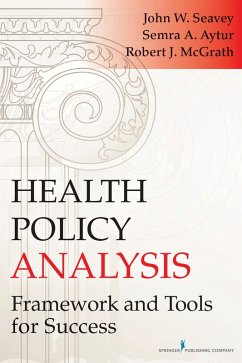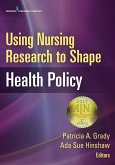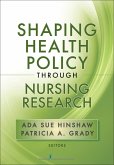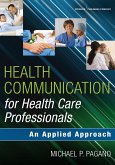This is the only resource to provide a step-by-step framework and expert guidance for preparing a policy analysis final paper or a capstone project for courses in health policy and health policy analysis. Building on a blend of theory and political considerations for creating a successful policy analysis, the text guides students through the process of building an analysis that encompasses policy background, issue statement, normative and stakeholder analysis, criteria for success, systematic review of policy options, recommendations, and a strategy for adoption. To illustrate each step of the process, the text traces the development of a policy on childhood obesity, the framework of which is directly applicable to a broad spectrum of policy analysis projects.
The text explains why each component of the health policy analysis framework is important and includes concrete guidance for obtaining resources and requisite tools for completing each task. It emphasizes the need for both objective research and the ability to understand the perspectives of stakeholders as well as the potential strengths, weaknesses, and biases of various sources. The book underscores the importance of considering alternatives in making policy recommendation a reality. Additionally, it focuses on understanding political realities and policy process to successfully navigate the system. Breakout boxes feature state-of-the-art examples to demonstrate the frameworkís application. The book also includes chapter summaries to reinforce the material and questions to spur further thought. The authors are health professionals connected nationally to relevant groups (e.g., AUPHA, APHA, Robert Wood Johnson, and environmental health policy groups), and have extensive networks in practice and academia.
Key Features:
The text explains why each component of the health policy analysis framework is important and includes concrete guidance for obtaining resources and requisite tools for completing each task. It emphasizes the need for both objective research and the ability to understand the perspectives of stakeholders as well as the potential strengths, weaknesses, and biases of various sources. The book underscores the importance of considering alternatives in making policy recommendation a reality. Additionally, it focuses on understanding political realities and policy process to successfully navigate the system. Breakout boxes feature state-of-the-art examples to demonstrate the frameworkís application. The book also includes chapter summaries to reinforce the material and questions to spur further thought. The authors are health professionals connected nationally to relevant groups (e.g., AUPHA, APHA, Robert Wood Johnson, and environmental health policy groups), and have extensive networks in practice and academia.
Key Features:
- Builds on a blend of theory and political considerations to create a successful policy analysis
- Provides a step-by-step framework for constructing a health policy analysis with real world application
- Integrates a variety of disciplines into the policy analysis
- Traces the development of a policy on childhood obesity to illustrate each step of the process
- Offers viable solutions to questions and issues students struggle with while preparing their analysis
Dieser Download kann aus rechtlichen Gründen nur mit Rechnungsadresse in A, D ausgeliefert werden.









